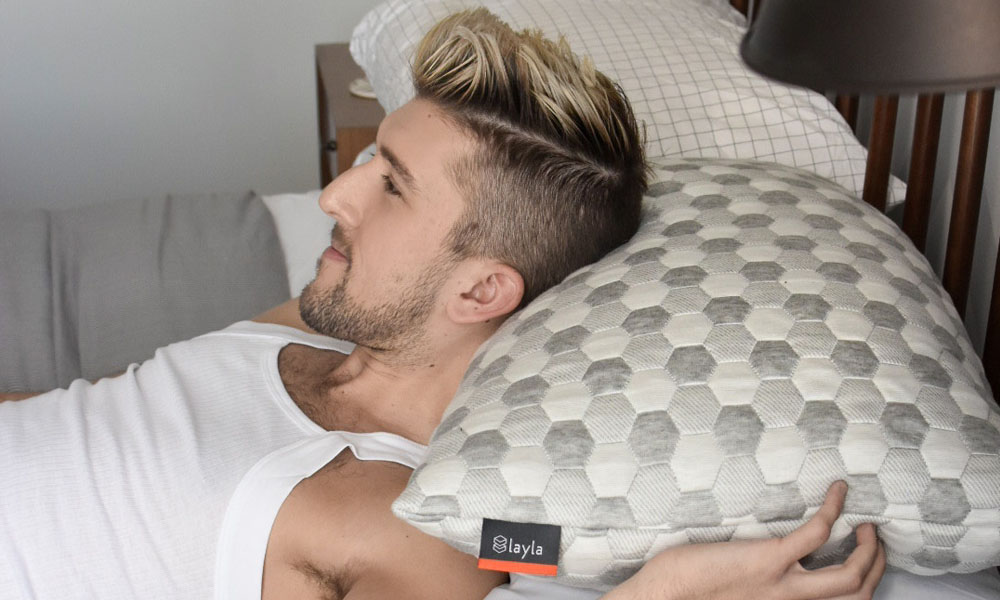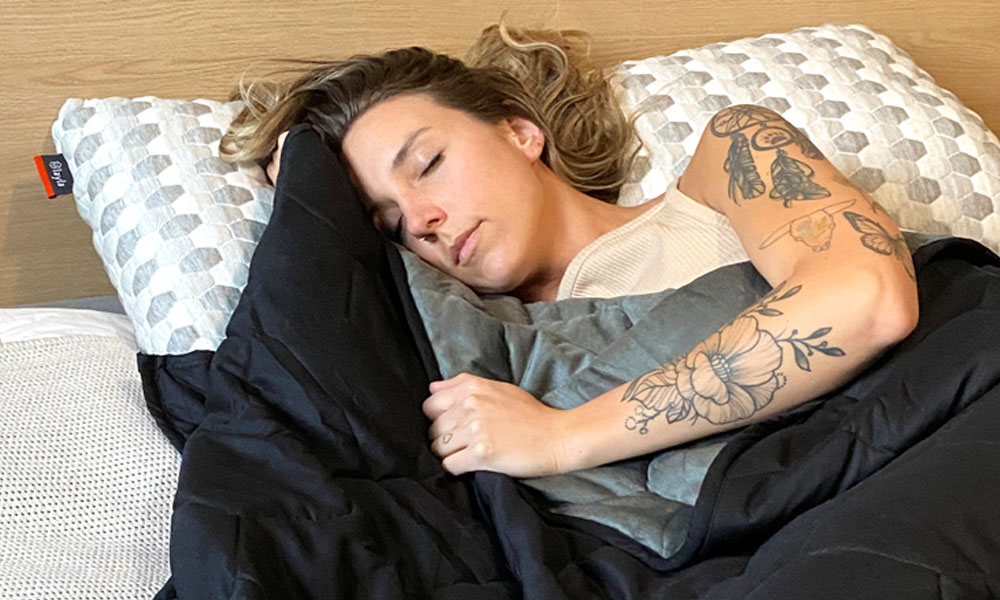Luckily, it doesn’t have to be this way.
Whether you have congestion all day long due to allergies, or you come down with a blocked nose at night only–there are remedies out there that will change your life. From altering your sleep position to buying hypoallergenic bamboo sheets, a few simple changes can offer huge benefits.
Let’s dive deeper into why you might have a hard time breathing at night and what you can do about it.
Most Common Causes of Congestion at Night
Anyone could be vulnerable to nasal congestion at night. Even if you don’t generally sneeze on high pollen count days or experience other nasal issues during the day, you could find it hard to breathe easy when it’s time to sleep.
Here is a quick list of some of the most common reasons you feel your sinuses being blocked when you lay down to sleep. It’s not an exhaustive list, but make sure to rule these out before you start reminiscing about all the nights you were able to breathe normally and get a full 8 hours of sleep.
Allergies: If you suffer from any allergies during the day, there’s a pretty good chance they’re also causing your nightly woes. You might assume you’re in the clear once you’re inside and far away from any live plants. However, you can drag in a lot of pollen on your clothes and irritants can blow in through open doors and windows. Plus, dust mites that live in mattresses and on sheets can cause a lot of nasal symptoms if you’re allergic to them.
Dehydration: If you’re not getting enough water, your nasal passages can become dry and irritated. Not only should you drink a lot of water during the day, but you may want to consider limiting alcohol intake in the evening if you notice it leads to breathing troubles in bed. And – not that night coffee is ever a good idea before bed – but it can lead to dehydration…as well as a midnight cleaning spree.
Dry Air: If you’re waking up congested regularly, consider the air quality in your sleep space. Dust mites flourish in particularly humid air, but if things get too dry your nose and throat will suffer. The sweet spot is about 45-50% humidity.
Sinus Infection or Cold: The first sign of a serious nasal infection or cold virus might be nasal congestion at night. As you lie down, slight inflammation that wasn’t so pronounced during the day can suddenly become painful when gravity takes over. Be on the lookout for other symptoms if you’re OK during the day but suddenly start to have breathing trouble for a few nights in a row.
Sleep Apnea: Breathing troubles at bedtime can also indicate a greater issue, including sleep apnea. This chronic issue happens most commonly when your throat muscles are too relaxed. Sleep apnea causes your breathing to intermittently stop and start and should be treated by a doctor.
How Can You Stop Waking Up with a Stuffy Nose?
Nasal congestion at night leads to tossing, turning, and probably some extra morning coffee. It’s bad enough when it happens once in a while – when the issue becomes chronic, it’s maddening. Here are some things to try that can often lead to relief (and a few more z’s).
Medical Interventions:
- Antihistamines. As their name suggests, antihistamines block histamines (which are compounds your body releases when it senses an inflammatory or allergic reaction). These are great during the day, and they may also be a good bedtime habit if you sleep with the windows open. Similarly, an over the counter nasal decongestant will help with occasional nasal congestion.
- Saline Rinse. Keeping your nose clean (literally) may also help you breathe better. Start using a neti pot before bed to clear out any remaining allergens from your day and get rid of pesky germs, too.
- Sleep Apnea Machine. If you suspect you have sleep apnea, a doctor can help you take a sleep test and may recommend a sleep apnea machine. While they’re not exactly the most flattering, wearing one of these contraptions can make sure your breathing passages remain open all night.
- Acupuncture. Some people find relief with acupuncture. If you’re trying to avoid medication or you just want to give more natural treatments a shot, a session with a good acupuncturist could clear your sinuses and have you sleeping like a log.
Environmental Changes:
Maybe the cause of your nasal congestion at night doesn’t require any medications. Simple habit changes can make a big difference. Before you go down a WebMD rabbit hole and diagnose yourself with chronic sinusitis or nasal polyps, try making these affordable alterations to your bedroom.
- Bigger Pillow.Waking up to a stuffy nose every morning could be the result of something as simple as your neck angle when you sleep. A super flat pillow is great for neck alignment, but it doesn’t do much for keeping inflamed sinus passages open. Doubling up on your pillows or using a bigger one will prop your head up and can open your airways. You may also want to sleep on your side instead of your back.
- Humidifier. As we mentioned above, dry air is a common culprit when it comes to nighttime congestion. Keeping a humidifier going all night will provide the moisture you need to avoid waking up with a stuffy nose and sore throat. This is particularly good advice in cold winter temperatures when frigid air leads to lots of nasal issues.
- Hypoallergenic Sheets. Dust mites feed on your dead skin cells, and there are millions of them in your bed. We know, ew. The good news is that they’re less likely to survive and thrive in certain types of fabrics. Organic cotton and bamboo, for instance, are less likely to promote the growth of their gross little colonies. Switch to bamboo sheets and wash them once a week to keep these little buggers at bay.
- No Pets Policy. Like it or not, your pets can bring a whole lot of allergens and other irritants into your sleep space. It’s cute how they sleep at the end of your bed – but at what cost? If you have an outdoor pet and nasal congestion at night, the solution may be to train your buddy to sleep in a dog bed instead of right in your face.
In addition to the above suggestions, you may want to take an NSAID at night to reduce nasal inflammation. And, as Healthline points out, sometimes you have to fight against your instinct to blow your nose. Nose blowing can create pressure in your nasal passages that causes fluid to go from your nose to your sinuses. Dab your nose and blow gently, one nostril at a time, when you absolutely need to.
Layla Sleep for Better Breathing
If you want to live better, you have to sleep better. Don’t believe us yet? WebMD says that improving your sleep leads to a sharper memory, increased heart health, and steadier blood sugar. Plus, it just feels good. Getting rid of nasal congestion at night is a must if you want to turn up your REM cycles.
It’s time to throw out your old mattress. If you’re not resting on comfortable, hygienic, heat wicking memory foam – you’re missing out. Not only does memory foam contour to your curves and have you waking up back and neck pain-free, but a Layla copper mattress is naturally resistant to some of the most common allergens found in bed. Add a set of bamboo sheets into the mix, and dust mites will have to find a new home.
Try out a Layla Sleep system today, and we’ll let you give your copper pillow, mattress, topper, and/or sheets a 120-night test run. If you’re not sleeping better by then (it’s unlikely but possible), you can return your purchases and we’ll give you a refund, without giving you a hard time.



